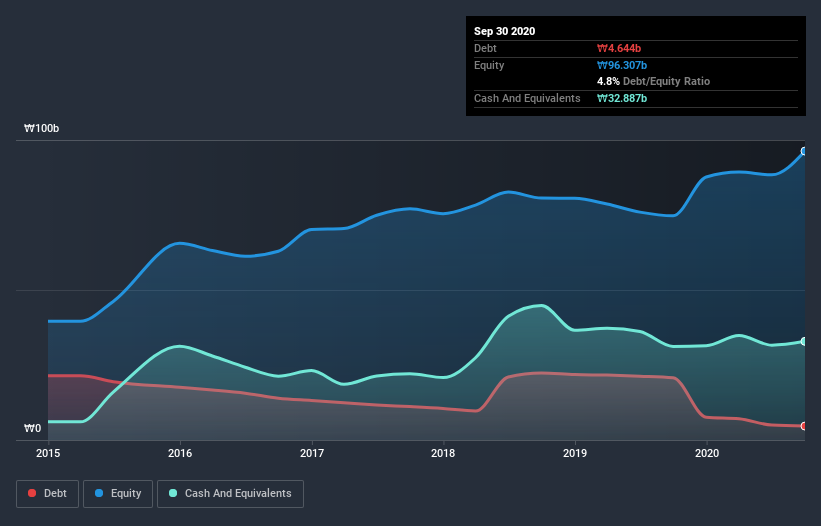Some say volatility, rather than debt, is the best way to think about risk as an investor, but Warren Buffett famously said that 'Volatility is far from synonymous with risk.' When we think about how risky a company is, we always like to look at its use of debt, since debt overload can lead to ruin. We can see that Exicon Co., Ltd. (KOSDAQ:092870) does use debt in its business. But the more important question is: how much risk is that debt creating?
Why Does Debt Bring Risk?
Debt is a tool to help businesses grow, but if a business is incapable of paying off its lenders, then it exists at their mercy. Part and parcel of capitalism is the process of 'creative destruction' where failed businesses are mercilessly liquidated by their bankers. However, a more common (but still painful) scenario is that it has to raise new equity capital at a low price, thus permanently diluting shareholders. By replacing dilution, though, debt can be an extremely good tool for businesses that need capital to invest in growth at high rates of return. When we examine debt levels, we first consider both cash and debt levels, together.
Check out our latest analysis for Exicon
What Is Exicon's Debt?
As you can see below, Exicon had ₩4.55b of debt at September 2020, down from ₩20.7b a year prior. However, its balance sheet shows it holds ₩32.9b in cash, so it actually has ₩28.3b net cash.

A Look At Exicon's Liabilities
According to the last reported balance sheet, Exicon had liabilities of ₩19.9b due within 12 months, and liabilities of ₩1.63b due beyond 12 months. Offsetting these obligations, it had cash of ₩32.9b as well as receivables valued at ₩7.58b due within 12 months. So it can boast ₩19.0b more liquid assets than total liabilities.
This short term liquidity is a sign that Exicon could probably pay off its debt with ease, as its balance sheet is far from stretched. Succinctly put, Exicon boasts net cash, so it's fair to say it does not have a heavy debt load!
Although Exicon made a loss at the EBIT level, last year, it was also good to see that it generated ₩6.6b in EBIT over the last twelve months. When analysing debt levels, the balance sheet is the obvious place to start. But ultimately the future profitability of the business will decide if Exicon can strengthen its balance sheet over time. So if you're focused on the future you can check out this free report showing analyst profit forecasts.
Finally, while the tax-man may adore accounting profits, lenders only accept cold hard cash. While Exicon has net cash on its balance sheet, it's still worth taking a look at its ability to convert earnings before interest and tax (EBIT) to free cash flow, to help us understand how quickly it is building (or eroding) that cash balance. In the last year, Exicon's free cash flow amounted to 45% of its EBIT, less than we'd expect. That's not great, when it comes to paying down debt.
Summing up
While it is always sensible to investigate a company's debt, in this case Exicon has ₩28.3b in net cash and a decent-looking balance sheet. So we are not troubled with Exicon's debt use. The balance sheet is clearly the area to focus on when you are analysing debt. However, not all investment risk resides within the balance sheet - far from it. To that end, you should learn about the 3 warning signs we've spotted with Exicon (including 1 which shouldn't be ignored) .
If you're interested in investing in businesses that can grow profits without the burden of debt, then check out this free list of growing businesses that have net cash on the balance sheet.
When trading Exicon or any other investment, use the platform considered by many to be the Professional's Gateway to the Worlds Market, Interactive Brokers. You get the lowest-cost* trading on stocks, options, futures, forex, bonds and funds worldwide from a single integrated account. Promoted
Valuation is complex, but we're here to simplify it.
Discover if Exicon might be undervalued or overvalued with our detailed analysis, featuring fair value estimates, potential risks, dividends, insider trades, and its financial condition.
Access Free AnalysisThis article by Simply Wall St is general in nature. It does not constitute a recommendation to buy or sell any stock, and does not take account of your objectives, or your financial situation. We aim to bring you long-term focused analysis driven by fundamental data. Note that our analysis may not factor in the latest price-sensitive company announcements or qualitative material. Simply Wall St has no position in any stocks mentioned.
*Interactive Brokers Rated Lowest Cost Broker by StockBrokers.com Annual Online Review 2020
Have feedback on this article? Concerned about the content? Get in touch with us directly. Alternatively, email editorial-team (at) simplywallst.com.
About KOSDAQ:A092870
Exicon
Operates as a semiconductor test solution company in Korea and internationally.
Adequate balance sheet with limited growth.
Similar Companies
Market Insights
Community Narratives




